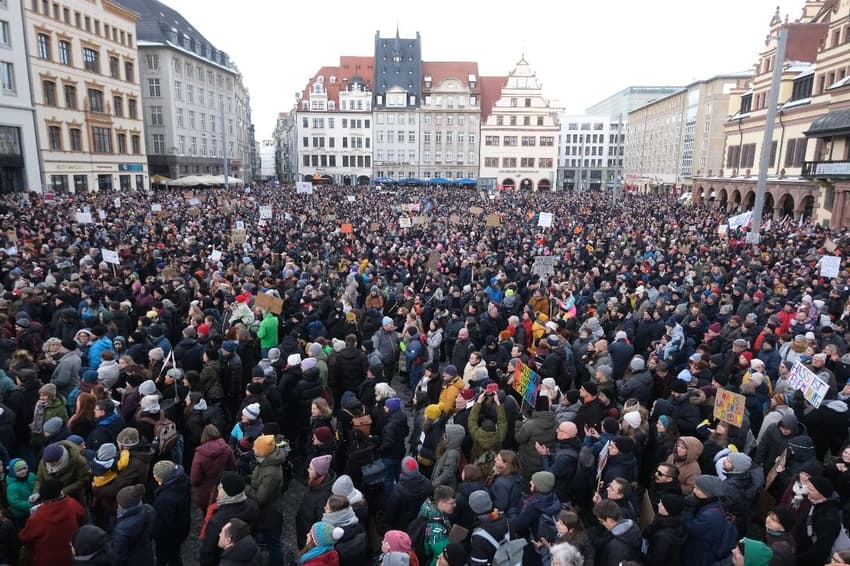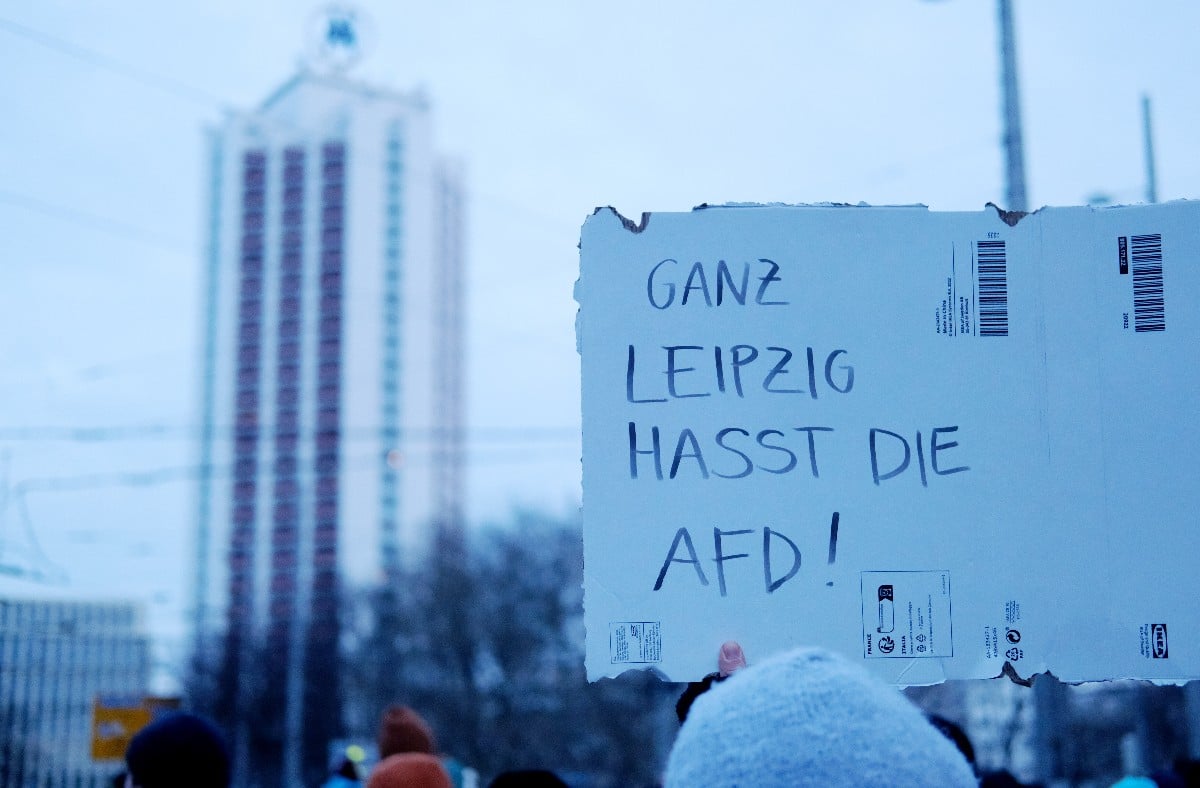How worried should Germany be about the far-right AfD after mass deportation scandal?

As tens of thousands of people in Germany take to the streets to protest against the far-right Alternative for Germany (AfD), the Local's Germany in Focus podcast asked a political scientist how concerning the party is and if a ban is likely.
People across Germany - from Hamburg to Munich - have been getting out on the streets with placards to protest the far-right AfD following reports that party members discussed a plan to deport people with a foreign background in Germany at a meeting of extremists.
At the weekend fresh protests took place, with organisers estimating around 1.4 million people in total attended demos calling for action against the far-right party and it's anti-immigration rhetoric.
It follows the publication of a report earlier this month by German news outlet Correctiv that exposed a meeting of far-right extremists that took place near Potsdam in November last year.
The investigation detailed AfD members and other individuals reportedly talking about a concept called 'remigration' - which would involve the mass deportation of immigrants and "non-assimilated citizens" from Germany - in the event of the party coming to power.
The meeting was also attended by Martin Sellner, a leader of Austria's extremist Identitarian Movement who reportedly presented the 'remigration' plans, which included details about deporting people to a "model state" in North Africa that could hold space for up to two million people.
The AfD distanced itself from the remigration plan, and party leader Alice Weidel is no longer working with her former aide Roland Hartweg, who is said to have attended the meeting.
READ ALSO: Germany's far-right AfD denies plan to expel 'non-assimilated foreigners'
But politicians, advocacy groups and people across Germany are outraged.
"It's really like a blast from the past, it reminds you of what happened in Germany in the 1930s and 40s," political scientist Kai Arzheimer from the University of Mainz, told the Germany in Focus podcast.

A sign at a protest on Sunday says: 'The whole of Leipzig hates the AfD'. Photo: picture alliance/dpa | Sebastian Willnow
"Obviously, we have a party, which is the second strongest opposition party in parliament; the strongest party in the eastern states, deliberating how they could deport, not just foreigners from Germany, but also Germans who have an unusual surname or whose skin is a different shade, or who have the 'wrong' kind of religion.
"This is very scary. And I'm in fact very worried about these developments. Unfortunately, not surprised, but still very worried."
PODCAST: Germany's citizenship law reaches crucial stage and could the AfD be banned?
With the party riding high in the polls, and with strong support in eastern regions ahead of three state elections later this year, many are wondering whether the investigation and backlash will have any impact on AfD voters.
Arzheimer said if an explosive report like this had come to light five or six years ago, he believes it would have severely limited support for the party.
But since then there have been a "drip feed of revelations", surfacing about the AfD, including that a former MP was involved in an alleged plot to overthrow the German state.
"It hasn't made a dent so far in support for the AfD," said Arzheimer. "So unfortunately, those perhaps 20, 22 percent of the German population who intend to vote for that party are not in somehow dissuaded by all these revelations about revolution. So I don't know what has to happen before these people change their minds."
'Germans need to wake up to this danger'
A debate has opened up about whether the AfD, which scored just over 10 percent of the vote in the federal election in 2021, should be banned.
Arzheimer said the hurdles to banning a political party in Germany are "very high".
Plans to ban the Communist Party and the neo-Nazi NPD failed "because the only institution that can ban a party in Germany is the Federal Constitutional Court".
Evidence that the AfD is "actively working against the democratic constitution" would have to be presented to the court and then a "super-majority of two-thirds" would have vote in favour of the ban, said Arzheimer.
READ ALSO: 'Silent majority' marches against Germany's far-right AfD
"So there is a real risk that this could backfire," he added. "Imagine the government goes to the court and the court says 'no, we're not going to ban them'. That would be a boon for the AfD, they would have like a stamp of approval by the highest court in the country."
This process to try and ban a party could also take around two years, giving the AfD plenty of time to promote their own narrative that would likely revolve around the state trying to 'silence' them.

Björn Höcke (AfD), parliamentary group leader in the Thuringian state parliament, speaks to journalists during a press conference in December 2023. Photo: picture alliance/dpa | Martin Schutt
"So this is why so far there is not too much political support for such a ban," said Arzheimer. "But at the moment, there could be a change of heart, if you wish, within the political class because of the danger that the AfD presents for democracy."
Arzheimer said Germans needed to wake up and take action against the party.
"What I think is important is that ordinary Germans wake up to this danger, and that those who are disaffected with politics but not happy to basically expel their neighbours from Germany, that they stop non voting or reconsider their vote for the AfD and instead vote for democratic parties."
Could the AfD enter a government in Germany?
Looking ahead to the elections in Thuringia, Brandenburg and Saxony, many people are wondering if the AfD could enter into power in future, either in a state or federal election, even though other parties have said they will not work with the AfD.
READ ALSO: Could the far-right AfD ever take power in Germany?
Arzheimer said it's not impossible but "highly unlikely" that the AfD will ever be in a federal government.
When it comes to the state level, it's more unclear. This is a year to watch how things develop develop.
"The AFD is particularly strong in Thuringia and Saxony. They are also particularly radical in these two states, and still, they are the strongest party - they have around 35 percent off the vote," he said, adding that it's possible that they could reach a majority in parliament depending on the performance of other parties.
If the AfD gets the presidency of parliament in Thuringia, a gap in the state constitution "could give power to a future AfD parliamentary president to swear in (AfD leader in Thuringia) Björn Höcke as minister president of Thuringia and then we're really in uncharted territory", said Arzheimer.
Höcke has been classified as a right wing extremist by the state's intelligence services.
"The state police would be under his control," said Arzheimer. "This is scary. It's not impossible, it's perhaps not even highly likely, it's still up in the air and depends on how the political process pans out over the next eight or nine months."
Comments
See Also
People across Germany - from Hamburg to Munich - have been getting out on the streets with placards to protest the far-right AfD following reports that party members discussed a plan to deport people with a foreign background in Germany at a meeting of extremists.
At the weekend fresh protests took place, with organisers estimating around 1.4 million people in total attended demos calling for action against the far-right party and it's anti-immigration rhetoric.
It follows the publication of a report earlier this month by German news outlet Correctiv that exposed a meeting of far-right extremists that took place near Potsdam in November last year.
The investigation detailed AfD members and other individuals reportedly talking about a concept called 'remigration' - which would involve the mass deportation of immigrants and "non-assimilated citizens" from Germany - in the event of the party coming to power.
The meeting was also attended by Martin Sellner, a leader of Austria's extremist Identitarian Movement who reportedly presented the 'remigration' plans, which included details about deporting people to a "model state" in North Africa that could hold space for up to two million people.
The AfD distanced itself from the remigration plan, and party leader Alice Weidel is no longer working with her former aide Roland Hartweg, who is said to have attended the meeting.
READ ALSO: Germany's far-right AfD denies plan to expel 'non-assimilated foreigners'
But politicians, advocacy groups and people across Germany are outraged.
"It's really like a blast from the past, it reminds you of what happened in Germany in the 1930s and 40s," political scientist Kai Arzheimer from the University of Mainz, told the Germany in Focus podcast.

"Obviously, we have a party, which is the second strongest opposition party in parliament; the strongest party in the eastern states, deliberating how they could deport, not just foreigners from Germany, but also Germans who have an unusual surname or whose skin is a different shade, or who have the 'wrong' kind of religion.
"This is very scary. And I'm in fact very worried about these developments. Unfortunately, not surprised, but still very worried."
PODCAST: Germany's citizenship law reaches crucial stage and could the AfD be banned?
With the party riding high in the polls, and with strong support in eastern regions ahead of three state elections later this year, many are wondering whether the investigation and backlash will have any impact on AfD voters.
Arzheimer said if an explosive report like this had come to light five or six years ago, he believes it would have severely limited support for the party.
But since then there have been a "drip feed of revelations", surfacing about the AfD, including that a former MP was involved in an alleged plot to overthrow the German state.
"It hasn't made a dent so far in support for the AfD," said Arzheimer. "So unfortunately, those perhaps 20, 22 percent of the German population who intend to vote for that party are not in somehow dissuaded by all these revelations about revolution. So I don't know what has to happen before these people change their minds."
'Germans need to wake up to this danger'
A debate has opened up about whether the AfD, which scored just over 10 percent of the vote in the federal election in 2021, should be banned.
Arzheimer said the hurdles to banning a political party in Germany are "very high".
Plans to ban the Communist Party and the neo-Nazi NPD failed "because the only institution that can ban a party in Germany is the Federal Constitutional Court".
Evidence that the AfD is "actively working against the democratic constitution" would have to be presented to the court and then a "super-majority of two-thirds" would have vote in favour of the ban, said Arzheimer.
READ ALSO: 'Silent majority' marches against Germany's far-right AfD
"So there is a real risk that this could backfire," he added. "Imagine the government goes to the court and the court says 'no, we're not going to ban them'. That would be a boon for the AfD, they would have like a stamp of approval by the highest court in the country."
This process to try and ban a party could also take around two years, giving the AfD plenty of time to promote their own narrative that would likely revolve around the state trying to 'silence' them.

"So this is why so far there is not too much political support for such a ban," said Arzheimer. "But at the moment, there could be a change of heart, if you wish, within the political class because of the danger that the AfD presents for democracy."
Arzheimer said Germans needed to wake up and take action against the party.
"What I think is important is that ordinary Germans wake up to this danger, and that those who are disaffected with politics but not happy to basically expel their neighbours from Germany, that they stop non voting or reconsider their vote for the AfD and instead vote for democratic parties."
Could the AfD enter a government in Germany?
Looking ahead to the elections in Thuringia, Brandenburg and Saxony, many people are wondering if the AfD could enter into power in future, either in a state or federal election, even though other parties have said they will not work with the AfD.
READ ALSO: Could the far-right AfD ever take power in Germany?
Arzheimer said it's not impossible but "highly unlikely" that the AfD will ever be in a federal government.
When it comes to the state level, it's more unclear. This is a year to watch how things develop develop.
"The AFD is particularly strong in Thuringia and Saxony. They are also particularly radical in these two states, and still, they are the strongest party - they have around 35 percent off the vote," he said, adding that it's possible that they could reach a majority in parliament depending on the performance of other parties.
If the AfD gets the presidency of parliament in Thuringia, a gap in the state constitution "could give power to a future AfD parliamentary president to swear in (AfD leader in Thuringia) Björn Höcke as minister president of Thuringia and then we're really in uncharted territory", said Arzheimer.
Höcke has been classified as a right wing extremist by the state's intelligence services.
"The state police would be under his control," said Arzheimer. "This is scary. It's not impossible, it's perhaps not even highly likely, it's still up in the air and depends on how the political process pans out over the next eight or nine months."
Join the conversation in our comments section below. Share your own views and experience and if you have a question or suggestion for our journalists then email us at [email protected].
Please keep comments civil, constructive and on topic – and make sure to read our terms of use before getting involved.
Please log in here to leave a comment.